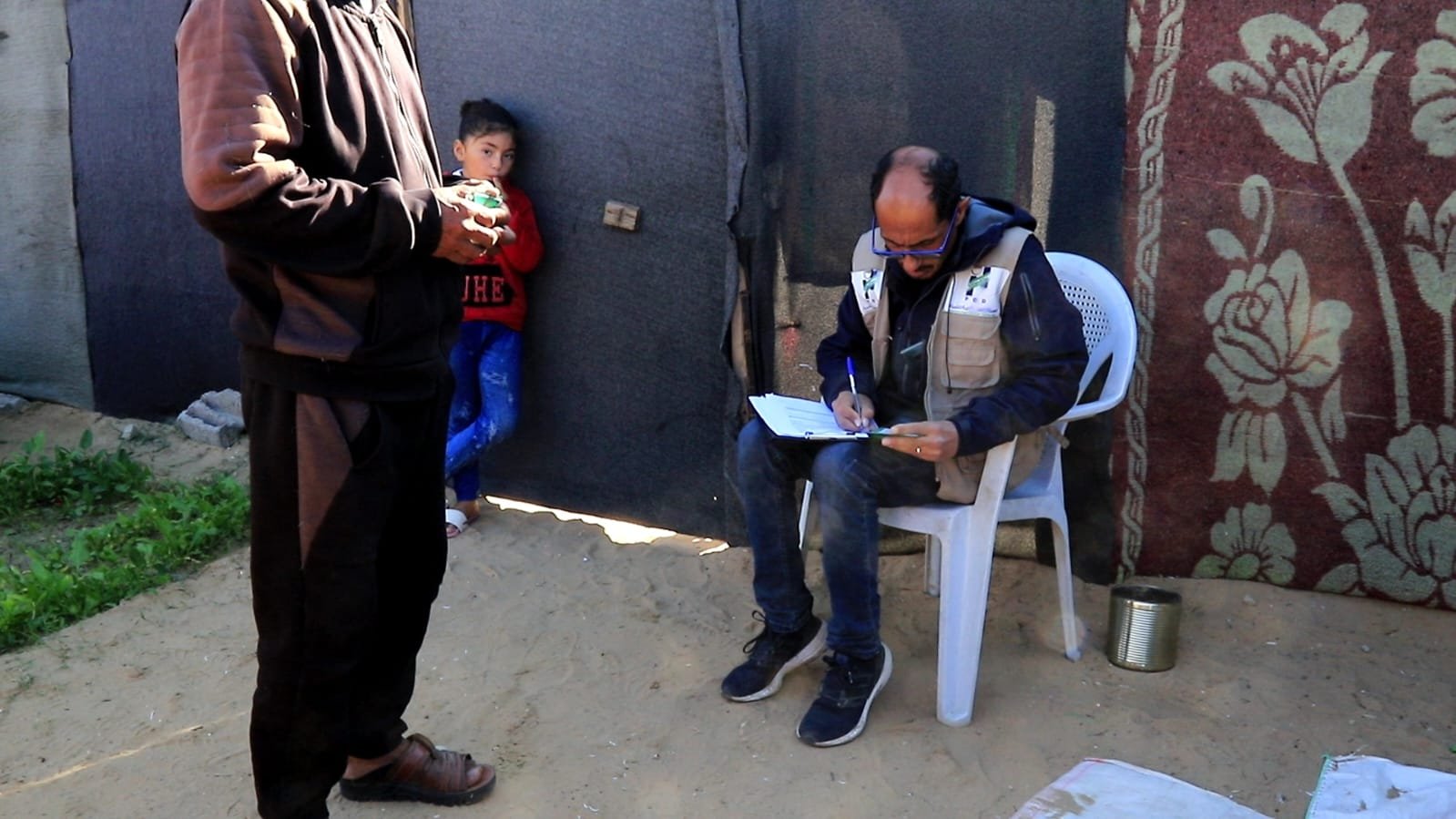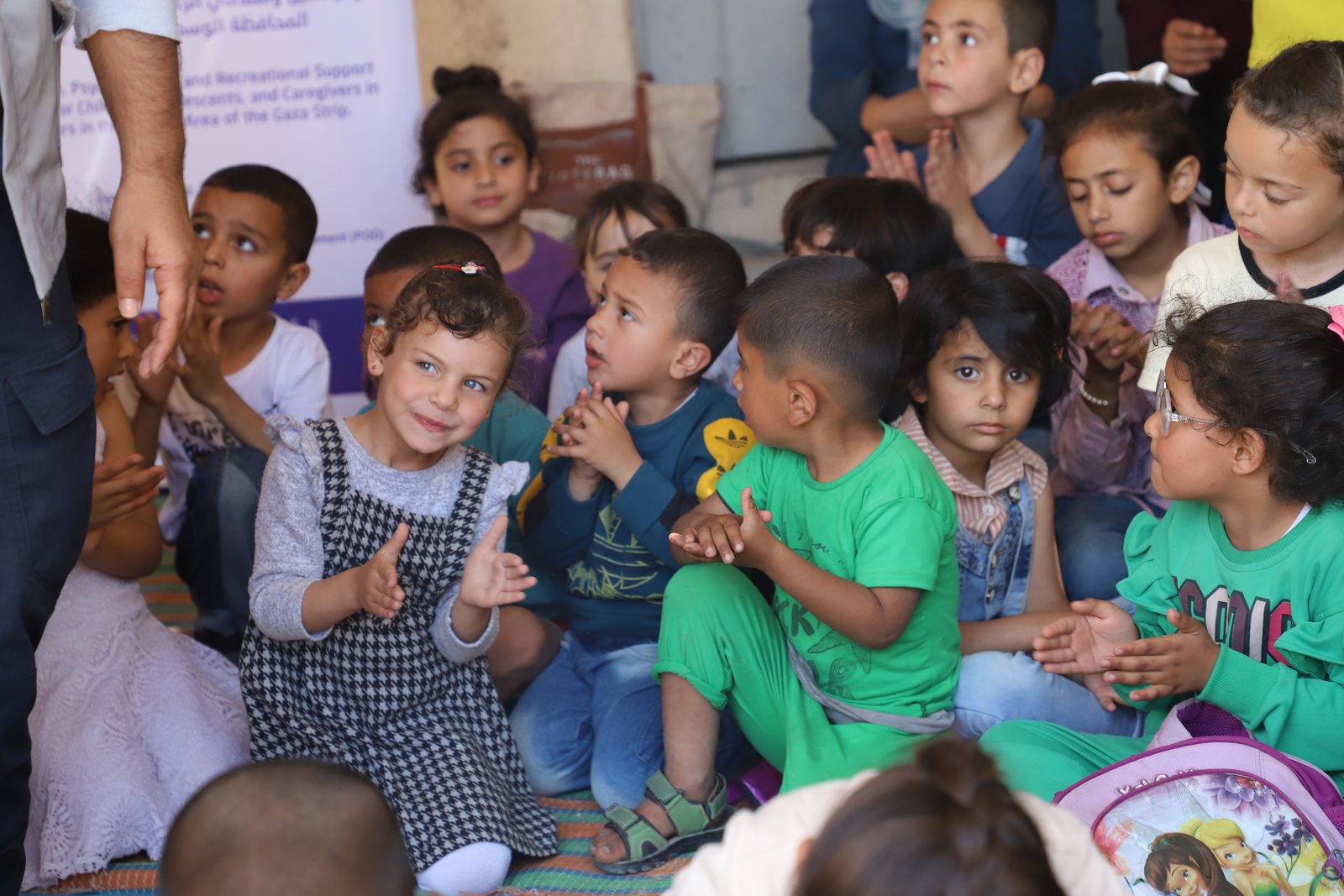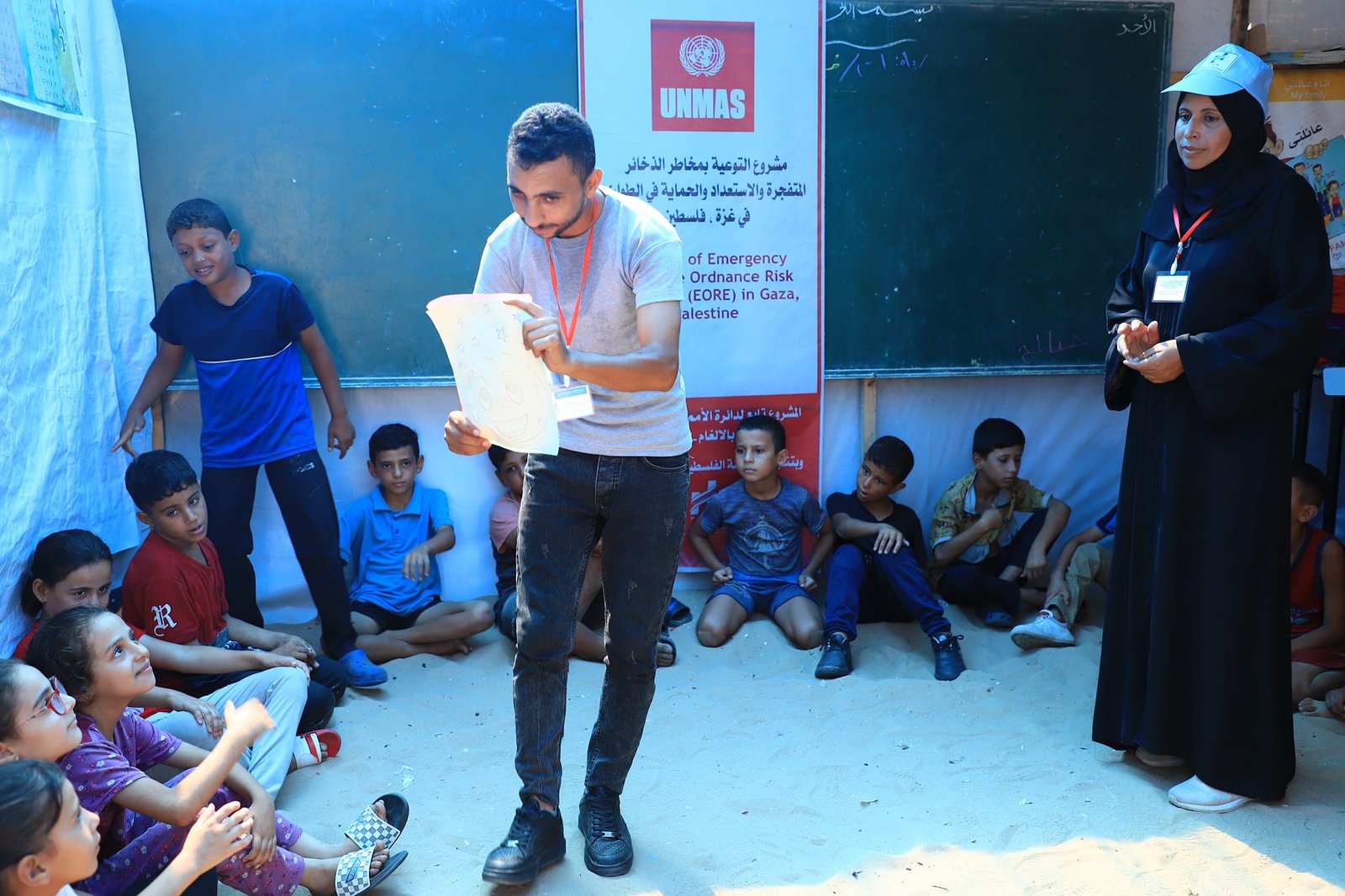
Mitigating the negative effects of the COVID-19 ..
| Target group | local community |
| The number of beneficiaries | 2700 |
| Duration of the project | 24 |
| Place of implementation | Middle Area |
| Project Status | finished |
| show ptoject | |
The Palestinian Organization for Development the COVID-19 Mitigation Project in the Gaza Strip, in partnership with the Palestinian Organization for Development and with funding from the United States Agency for International Development (USAID), from February 2022 to January 15, 2023. The project aimed to achieve two main objectives: first, to accelerate widespread and equitable access to safe and effective COVID-19 vaccines; and second, to reduce COVID-19-related morbidity and mortality, limit transmission, and strengthen health systems for prevention, detection, and response to pandemic threats. A significant number of residents from the Central Governorate benefited from the project’s activities. Approximately 2,313 individuals participated in health awareness sessions and received personal hygiene kits. Additionally, around 377 families were visited at home, where awareness sessions were conducted and hygiene kits were distributed. The project also hosted a Caritas medical clinic on a weekly basis, providing free screening and treatment for respiratory and influenza illnesses, as well as monitoring and medical care for COVID-19 patients. Furthermore, around 20 awareness messages were posted on the Authority’s social media platforms to promote COVID-19 awareness and encourage vaccination.

| Target group | war victims |
| The number of beneficiaries | 10000 |
| Duration of the project | 12 |
| Place of implementation | Middle Area |
| Project Status | finished |
| show ptoject | |
This project aims to educate children, teenagers, and youth about the fundamentals of safety from war remnants, with the goal of protecting them from the dangers they may encounter. The project focuses on delivering comprehensive awareness programs that teach participants how to identify dangerous and unexploded objects, the necessary steps to take when such items are found, and the importance of staying away from them and reporting them to the appropriate authorities. The project equips participants with the knowledge and skills needed to avoid hazards in areas affected by wars and conflicts, striving to create a safer environment by reducing injuries and accidents related to war remnants. Additionally, it contributes to raising community awareness about the importance of prevention and safe handling of these remnants, ensuring the protection of younger generations and the community as a whole from potential risks.

S-WASH Project-Multi-Sectoral Emergency Response in Gaza 🇵🇸
| Target group | Displacement camps |
| The number of beneficiaries | 50000 |
| Duration of the project | 15 |
| Place of implementation | The Central District and the Mawasi District of Khan Yunis |
| Project Status | active |
| show ptoject | |
S-WASH Project: Multi-Sectoral Emergency Response in Gaza 🇵🇸 In response to the escalating humanitarian crisis in Gaza, our organization launched the S-WASH Project: Multi-Sectoral Emergency Response, a critical initiative aimed at protecting the lives and dignity of displaced families through coordinated interventions in the Shelter, Water, Sanitation, and Hygiene (WASH), and Water Trucking sectors. 🔹 Shelter Sector: A total of 7,300 tents were distributed over four phases to provide immediate shelter to families who lost their homes. Additionally, we delivered 13,000 hygiene kits and sealing kits to ensure privacy and protection, along with 500 clothing kits for newly displaced families. 🔹 WASH Sector: We supply 150 cubic meters of clean drinking water daily to displacement camps, benefiting over 28,000 people daily. Moreover, 450 individual mobile toilets were installed in East Khan Younis to support recovery and improve living conditions. Within the project, a dedicated awareness team educates communities on personal hygiene, safe water storage, and other essential health practices. 🔹 Water Trucking – Supported by IRUSA: Thanks to the partnership with Islamic Relief USA (IRUSA), clean water is distributed via dedicated water trucks to the most affected areas, helping alleviate suffering and strengthen resilience. We remain committed to the belief that every human being deserves safe shelter, clean water, and dignity.

| Target group | Caregivers + Children (3-16) |
| The number of beneficiaries | 3400 |
| Duration of the project | 12 |
| Place of implementation | Deir al-Balah (Al-Bassa) |
| Project Status | active |
| show ptoject | |
In the face of ongoing crises and increasing psychological pressure on families, mental health has become an essential pillar for fostering individual and collective resilience. With this in mind, we launched the Psychosocial Support Project — a holistic initiative designed to create safe, empowering spaces for children and their caregivers, particularly in vulnerable and high-risk communities. 🔹 The project primarily targets children aged 3 to 16, providing them with three structured psychosocial sessions based on non-formal education methodologies. These sessions combine interactive movement, music, and hands-on activities to promote emotional expression, communication skills, and self-confidence in a safe, nurturing environment. 🔹 In parallel, the project provides three focused sessions for caregivers – including parents and guardians – addressing: Emotion Normalization – Understanding and validating emotional experiences Self-Care – Empowering caregivers to prioritize their own wellbeing Crisis Management – Building resilience and practical coping strategies in times of stress 📍 The project also targets families in displacement shelters, schools, and surrounding host communities, ensuring that psychosocial support reaches those facing the most intense psychological challenges due to displacement, trauma, or poverty. 💡 More than 3,400 individuals are directly benefiting from this intervention – including 2,663 children and 767 caregivers – making this one of the most impactful community-based mental health projects implemented in the area recently. 🔹 Our vision is clear: to restore dignity, build emotional resilience, and empower individuals to overcome challenges not just with survival, but with strength. We believe that psychosocial wellbeing is not a luxury – it is a right, and a fundamental step toward healing, growth, and a better future. This project is not just a humanitarian response – it's an investment in human dignity and long-term recovery.

Emergency Risk Education on Explosive Ordnance in ..
| Target group | Internally displaced persons, farmers, fishermen, children and their families, scrap and solid waste collectors, and rubble removal workers |
| The number of beneficiaries | 10000 |
| Duration of the project | 13 |
| Place of implementation | Gaza Strip governorates |
| Project Status | active |
| show ptoject | |
Amid ongoing conflict and growing threats to civilian lives, we are launching a vital humanitarian initiative to deliver emergency awareness sessions on the dangers of explosive ordnance to the most at-risk populations. This project aims to empower affected communities — including internally displaced persons (IDPs), farmers, fishermen, children and their caregivers, scrap and waste collectors, and rubble removal workers — with the knowledge and tools to protect themselves and reduce life-threatening risks. ✨ Project Objectives: Train 30 individuals (15 gender-balanced teams) to deliver emergency awareness sessions. Reach 99,000 beneficiaries every three months from vulnerable communities. Distribute printed educational materials to reinforce key safety messages. 🛠️ Key Activities: Structured awareness sessions for adults using participatory methods. Interactive sessions for children using play-based learning. Street sessions targeting adults through short, direct interactions. Distribution of printed materials such as brochures and posters at target locations. Digital campaigns via social media, including awareness videos and sponsored posts for adults and children. Awareness messaging through SMS campaigns. Public awareness broadcasts through radio channels. This project is implemented in collaboration with the United Nations Mine Action Service (UNMAS) and contributes directly to its strategic objectives in Palestine — to reduce harm and promote safety through risk education.

Mitigating the negative effects of the COVID-19 pandemic in the Gaza Strip
| Target group | local community |
| The number of beneficiaries | 2700 |
| Duration of the project | 24 |
| Place of implementation | Middle Area |
| State project | finished |
| show ptoject | |
The Palestinian Organization for Development the COVID-19 Mitigation Project in the Gaza Strip, in partnership with the Palestinian Organization for Development and with funding from the United States Agency for International Development (USAID), from February 2022 to January 15, 2023. The project aimed to achieve two main objectives: first, to accelerate widespread and equitable access to safe and effective COVID-19 vaccines; and second, to reduce COVID-19-related morbidity and mortality, limit transmission, and strengthen health systems for prevention, detection, and response to pandemic threats. A significant number of residents from the Central Governorate benefited from the project’s activities. Approximately 2,313 individuals participated in health awareness sessions and received personal hygiene kits. Additionally, around 377 families were visited at home, where awareness sessions were conducted and hygiene kits were distributed. The project also hosted a Caritas medical clinic on a weekly basis, providing free screening and treatment for respiratory and influenza illnesses, as well as monitoring and medical care for COVID-19 patients. Furthermore, around 20 awareness messages were posted on the Authority’s social media platforms to promote COVID-19 awareness and encourage vaccination.

War remnants safety project
| Target group | war victims |
| The number of beneficiaries | 10000 |
| Duration of the project | 12 |
| Place of implementation | Middle Area |
| State project | finished |
| show ptoject | |
This project aims to educate children, teenagers, and youth about the fundamentals of safety from war remnants, with the goal of protecting them from the dangers they may encounter. The project focuses on delivering comprehensive awareness programs that teach participants how to identify dangerous and unexploded objects, the necessary steps to take when such items are found, and the importance of staying away from them and reporting them to the appropriate authorities. The project equips participants with the knowledge and skills needed to avoid hazards in areas affected by wars and conflicts, striving to create a safer environment by reducing injuries and accidents related to war remnants. Additionally, it contributes to raising community awareness about the importance of prevention and safe handling of these remnants, ensuring the protection of younger generations and the community as a whole from potential risks.

S-WASH Project-Multi-Sectoral Emergency Response in Gaza 🇵🇸
| Target group | Displacement camps |
| The number of beneficiaries | 50000 |
| Duration of the project | 15 |
| Place of implementation | The Central District and the Mawasi District of Khan Yunis |
| State project | active |
| show ptoject | |
S-WASH Project: Multi-Sectoral Emergency Response in Gaza 🇵🇸 In response to the escalating humanitarian crisis in Gaza, our organization launched the S-WASH Project: Multi-Sectoral Emergency Response, a critical initiative aimed at protecting the lives and dignity of displaced families through coordinated interventions in the Shelter, Water, Sanitation, and Hygiene (WASH), and Water Trucking sectors. 🔹 Shelter Sector: A total of 7,300 tents were distributed over four phases to provide immediate shelter to families who lost their homes. Additionally, we delivered 13,000 hygiene kits and sealing kits to ensure privacy and protection, along with 500 clothing kits for newly displaced families. 🔹 WASH Sector: We supply 150 cubic meters of clean drinking water daily to displacement camps, benefiting over 28,000 people daily. Moreover, 450 individual mobile toilets were installed in East Khan Younis to support recovery and improve living conditions. Within the project, a dedicated awareness team educates communities on personal hygiene, safe water storage, and other essential health practices. 🔹 Water Trucking – Supported by IRUSA: Thanks to the partnership with Islamic Relief USA (IRUSA), clean water is distributed via dedicated water trucks to the most affected areas, helping alleviate suffering and strengthen resilience. We remain committed to the belief that every human being deserves safe shelter, clean water, and dignity.

Psychosocial Support Project
| Target group | Caregivers + Children (3-16) |
| The number of beneficiaries | 3400 |
| Duration of the project | 12 |
| Place of implementation | Deir al-Balah (Al-Bassa) |
| State project | active |
| show ptoject | |
In the face of ongoing crises and increasing psychological pressure on families, mental health has become an essential pillar for fostering individual and collective resilience. With this in mind, we launched the Psychosocial Support Project — a holistic initiative designed to create safe, empowering spaces for children and their caregivers, particularly in vulnerable and high-risk communities. 🔹 The project primarily targets children aged 3 to 16, providing them with three structured psychosocial sessions based on non-formal education methodologies. These sessions combine interactive movement, music, and hands-on activities to promote emotional expression, communication skills, and self-confidence in a safe, nurturing environment. 🔹 In parallel, the project provides three focused sessions for caregivers – including parents and guardians – addressing: Emotion Normalization – Understanding and validating emotional experiences Self-Care – Empowering caregivers to prioritize their own wellbeing Crisis Management – Building resilience and practical coping strategies in times of stress 📍 The project also targets families in displacement shelters, schools, and surrounding host communities, ensuring that psychosocial support reaches those facing the most intense psychological challenges due to displacement, trauma, or poverty. 💡 More than 3,400 individuals are directly benefiting from this intervention – including 2,663 children and 767 caregivers – making this one of the most impactful community-based mental health projects implemented in the area recently. 🔹 Our vision is clear: to restore dignity, build emotional resilience, and empower individuals to overcome challenges not just with survival, but with strength. We believe that psychosocial wellbeing is not a luxury – it is a right, and a fundamental step toward healing, growth, and a better future. This project is not just a humanitarian response – it's an investment in human dignity and long-term recovery.

Emergency Risk Education on Explosive Ordnance in Palestine | In Partnership with UNMAS
| Target group | Internally displaced persons, farmers, fishermen, children and their families, scrap and solid waste collectors, and rubble removal workers |
| The number of beneficiaries | 10000 |
| Duration of the project | 13 |
| Place of implementation | Gaza Strip governorates |
| State project | active |
| show ptoject | |
Amid ongoing conflict and growing threats to civilian lives, we are launching a vital humanitarian initiative to deliver emergency awareness sessions on the dangers of explosive ordnance to the most at-risk populations. This project aims to empower affected communities — including internally displaced persons (IDPs), farmers, fishermen, children and their caregivers, scrap and waste collectors, and rubble removal workers — with the knowledge and tools to protect themselves and reduce life-threatening risks. ✨ Project Objectives: Train 30 individuals (15 gender-balanced teams) to deliver emergency awareness sessions. Reach 99,000 beneficiaries every three months from vulnerable communities. Distribute printed educational materials to reinforce key safety messages. 🛠️ Key Activities: Structured awareness sessions for adults using participatory methods. Interactive sessions for children using play-based learning. Street sessions targeting adults through short, direct interactions. Distribution of printed materials such as brochures and posters at target locations. Digital campaigns via social media, including awareness videos and sponsored posts for adults and children. Awareness messaging through SMS campaigns. Public awareness broadcasts through radio channels. This project is implemented in collaboration with the United Nations Mine Action Service (UNMAS) and contributes directly to its strategic objectives in Palestine — to reduce harm and promote safety through risk education.